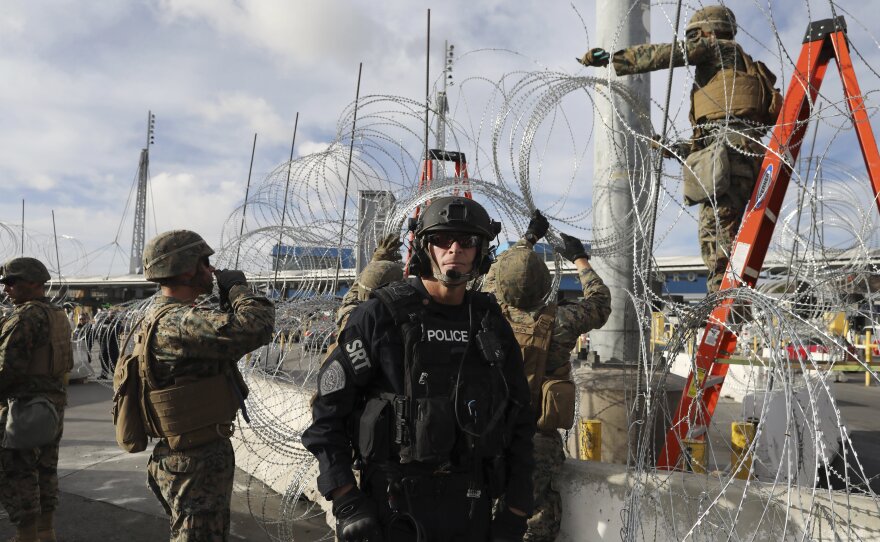Not everyone in a military uniform will be considered a veteran when they leave the service, including some National Guard troops who have served along the border.
These troops also will be ineligible for veterans’ benefits, but Congress is looking at trying to level the field for troops for guard and reserves.
In April 2018, President Trump ordered 2,000 National Guard troops to the U.S.-Mexico border to aid Homeland Security.
During a tour on the border in October 2018, Border Patrol spokesman William Rogers complimented the California National Guard troops who were working inside the Border Patrol station in San Diego, acting as dispatchers and monitoring cameras.
“What’s most important about it to us is, prior to the National Guard soldiers filling these spots, we had to have sworn agents filling these spots,” Rogers said.
Despite the positive words, some of those guard troops who worked along the border in uniform may never meet the federal definition of a veteran.
One of the things National Guard troops need to qualify for Veterans Affairs benefits — like health care or the Forever GI Bill — is to serve 180 days continuously on active duty. That means being requested by the federal government under specific circumstances and then serving 180 consecutive days, said Daniel Elkins, a California National Guard Special Forces operator with a unit based in Los Angeles.
“This affects many of the National Guard. For example, currently there is a federally declared border crisis that’s going on,” Elkins said.
Even though President Trump called up guard troops and the federal government paid for the operation, but under federal rules, in the majority of cases the kind of orders where were under did not qualify them for benefits under the Forever GI Bill or for health care offered by the Veterans Health Administration, he said.
Elkins also works for the Enlisted Association of National Guard United States. The association is lobbying to bring greater parity between active-duty troops and those in the guard and reserve. One idea is to make it easier for them to qualify to become veterans under federal law, by letting them add up all the time they serve on federal orders instead of just missions that last for 180 consecutive days.
“Those should be added up and when you meet that threshold,” Elkins said.
Most of the time, guard troops are under the control of a state’s governor, who can call them up to help with natural disasters like the wildfires in California. But there are a variety of orders that can be used to call up the National Guard. States like California also work with the U.S. Drug Enforcement Administration on anti-drug operations. Guard troops working on those missions can earn enough credit to be considered veterans.
Rep. Mike Levin, D-Oceanside, chairs a veterans subcommittee that recently held a hearing on these parity issues.
“We haven’t followed a very basic principle,” Levin said. “That is, if you’re expected to be doing the same thing, putting your life on the line for whatever particular mission, I believe you should get the same pay and benefits.”
Levin said Congress has been slow to respond to the changing role of the guard, which has been used more consistently since the terrorist attacks on Sept. 11, 2001.
“Expectations are placed on our guard and reserves that perhaps weren’t there previously. We need to make sure federal policy reflects that,” he said.
Cost is a factor. Under the proposed changes, more troops would qualify for federal benefits. Congress changed the law so anyone who retires from the guard or reserves after 20 years is officially a veteran. But the law did not allow them to qualify for federal benefits.
Elkin said he talks to former National Guard troops who applied for benefits under the GI bill after reporting to help out in response to disasters like Hurricane Katrina along the Gulf Coast or Hurricane Maria in Puerto Rico.
“These people deploy. They’re being told they are being deployed. And they assume they have the same level of benefits,” Elkins said.
But they don’t. The system impacts retention in the guard, but the consequences can run much deeper. The federal benefits that guard troops often aren’t eligible for include long-term care for mental health at the VA, he said.
In figures released in September, the VA adds up the number of veterans a day who die by suicide. The grim statistic does not include 919 suicides in 2017 among guard and reserve members who never achieved veteran status. The VA says that adds another 2.5 people per day who kill themselves — all former military troops but not considered veterans.







